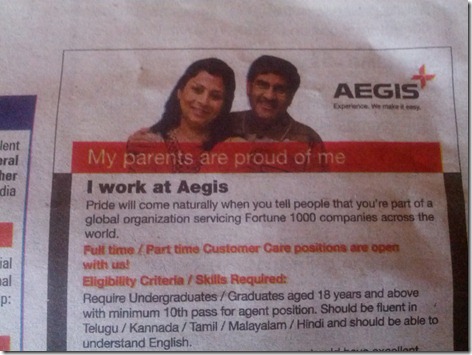Advertisements have always fascinated me. They reflect desires, cravings and thoughts of the people that they are aiming at. Ads, all be it print, or television or online, show who we want to become, what we aspire towards. I was browsing in the morning through the Thursday edition of my loo-paper, Bangalore Mirror, when I came across these two advertisements in their recruitment section:
Now, let me add in a disclaimer before I continue – this blog post is NOT about the companies to whom these adverts belong to. It is just about what I thought about when I saw these ads.
Both these recruitment ads target middle class professionals (in Bangalore) with something that they would want: Work with a Giant or a Global Organisation or an MNC. It’s something that Indian professionals aspire towards—a big, fat, well-known giant of a company. To work for a big organisation which has gazillions of employees. And maybe big, fat, giant cheques too. Bigger, the better. Big is good, giant is simply spectacular. It’s about feeling good that your name comes before a well-recognised brand, an MNC/foreign brand. Working for a Giant is about aspiration. Like in the second ad which shows a young woman and says: My parents are proud of me (because I work in an MNC. Rhymes, too!). Indians want to work in big places. Bigger the company, better it is for one’s ego. Bankers prefer to give loan to people who work in these giant organisations, thinking it might be safer to. If you tell a banker that you work on your own, the assumption is, I don’t know how much you earn, so I won’t give you a credit card.
In the pubs, over a drink, you hear proud, arrogant conversations like: I have just joined (add big brand MNC name) company. If the person sitting opposite doesn’t work for a giant, she answers apologetically, that she’s on her own, or works for some relatively unknown mid-size company. Come to think of it, the person might be saying that one is a VP or CEO of an organisation (big giant ego-tags instead of big giant company tags).
Ironically, I have never heard these conversations veer towards what these two people might actually be doing in the big or small company. For what kind of work you do, is not that important, not for parents or friends or relatives. There are two things that everyone wants to know, actually three: your giant position, your giant company’s name, your giant paycheck.
An NRI lady, who has returned from the USA to open an NGO in Bangalore, noted the question that people ask her in this city: Where do you work? (as opposed to What do you do?) Since then, I (who work on my own and I am NO giant) have noticed what people ask me as conversation starters: Where do you work? AND Who do you work for? When I tell them, they lose interest. It’s as if the servile mentality which started with the 200 years of British rule still continues in this city (I work for the British government as a clerk, said proudly). But, what about the kind of work you do in it? Are you a clerk in a big org?
I just remembered an incident which happened to me at the passport office in Bangalore last year. The IAS officer (the final one who took the passport for renew) asked me where I worked. When I replied, on my own, a conversation of assumptions developed. His assumption was: Oh, so you are a writer, eh? That’s not a career/profession. He was sure about it. When I asked why, his answer was, it doesn’t pay much, does it? Then it’s just a hobby and not a career. With that he dismissed me. As if, I, as an un-earning member of the society, who does uneconomic things like writes blogs all day for free view and stories for pittance, is not doing something worthwhile, for a simple reason that I don’t contribute to the economics of the society. That’s the aspiring middle class of India today. That’s most of the people you meet in Bangalore. They want giant jobs, giant salaries, giant cars, giant houses to appease giant egos.
And I am a little ant in a world of giants. I like it that way.



